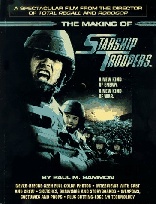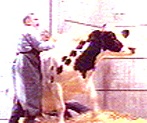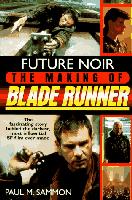Paul M. Sammon Interview
| What is BR? |
| News & Views |
| The FAQ |
| Encyclopedia |
| Quotes |
| People |
| Locations |
| Scripts |
| Analysis |
| Fan-tastic |
| BR Fun |
| BR Game |
| BR Magazine |
| BR Comic |
| Downloads |
| Collectibles |
| Related |
| Links |
| Site Info |
| Search Site |
BRmovie.com is the Home of Blade Runner - the current Blade Runner FAQ, news, resources, links, quotes, scripts and everything else Blade Runner.

![]()
Blade Runner
Buy this Mini Poster at AllPosters.com
|
Any
Comments?
Please e-mail the Webmaster |
| Want the DVD? Or the BR Game? Don't know which books or music to get? Maybe you'd like a Deckard action figure? Make sure you check the BR Related section for all your BR choices. |
|
N: Have you worked on any major movies recently?
Finally, as far as my personal life goes - I hope I'm not boring you here. N: Not at all. PS: Okay. Well, you asked for it. Back in 1982, I was doing many of the same things I'm doing today. Reading, voraciously. Watching every type of film imaginable. Getting into trouble. Playing guitar. Traveling. Shooting photographs. Writing. Lecturing. Living unconventionally. Grappling with the existential paradoxes of the universe. All that nonsense. N: What exactly did you think you were getting into when you got the assignment from Cinefantastique (and associated articles in Omni) to follow the filming of Blade Runner? Did you ever think it would lead to a book? PS: Never. And I really had no idea of what to initially expect from the people who were making BR. See, I'd already been around the film business long enough to know that the tone of each project, its overall personality, differs from movie to movie. Which means that sometimes a production company can be warm and accommodating, while other times it can be cold and uncooperative. Or everything in between. Those kinds of variables greatly influence what a journalist is able to pull out of a production - facts, set visits, interviews, or photos. All of which, of course, shapes the final piece you're supposed to write.
There's always been a curious love/hate relationship between Hollywood and film journalists, you know. The people involved with the actual creation of a film - its cast and crew - usually treat entertainment journalists relatively well. Unless you're absolutely incompetent. Or a jerk. Or someone with an ax to grind. I mean, filmmakers usually want their movie to get exposure; that way audiences can get enough advance word on a project so that, when it finally comes out, they'll remember that advance word and want to see the picture. Conversely, the people involved with the distribution and marketing of a film - studios and publicists - want to control whatever you write as much as possible, at least in the sense of keeping any controversial or negative aspects of the production away from the press. Studios and publicists can also be very, um, counterproductive concerning the process of photo approval, especially when they withhold illustrations they feel shouldn't see print before a film is released. That approach has only gotten worse, by the way, which makes me grateful that I actually work in the film industry most of the time now, instead of just writing about it. Because today's journalists typically have to pass through so many layers of approval just to get a handful of stills that the process drives them right up the wall.
|

 PS:
The last big-budget feature I crewed on, I guess, would be Starship
Troopers, Verhoeven's parody of Heinlein's classic SF novel.
I was on that one for about a year, year-and-a-half. Mostly as a
special effects still photographer. Oh, and I authored a Making
Of Starship Troopers book, too, for Boulevard Books. That came
out in 1997, right after Future Noir. And because of that
book, I was on the Starship sets nearly every day, just like
Blade Runner. I really enjoyed working on Starship Troopers,
mainly because one of my best friends, Jon Davison, was producing
that, and because it was based on a book I'd read and adored as
a kid, and because it gave me a chance to work with Phil Tippett
again. Phil's a special effects maestro who's incredibly sharp and
very, very funny; we met during the first RoboCop, which
was one of my films when I was working at Orion as a studio suit.
PS:
The last big-budget feature I crewed on, I guess, would be Starship
Troopers, Verhoeven's parody of Heinlein's classic SF novel.
I was on that one for about a year, year-and-a-half. Mostly as a
special effects still photographer. Oh, and I authored a Making
Of Starship Troopers book, too, for Boulevard Books. That came
out in 1997, right after Future Noir. And because of that
book, I was on the Starship sets nearly every day, just like
Blade Runner. I really enjoyed working on Starship Troopers,
mainly because one of my best friends, Jon Davison, was producing
that, and because it was based on a book I'd read and adored as
a kid, and because it gave me a chance to work with Phil Tippett
again. Phil's a special effects maestro who's incredibly sharp and
very, very funny; we met during the first RoboCop, which
was one of my films when I was working at Orion as a studio suit.
 So
when I first contacted Brighton Productions, the one-shot corporation
Michael Deeley set up to produce Blade Runner, the only thing
I knew to expect was the unexpected - there were a lot of different
ways Brighton could've responded to me. Thankfully, both Deeley
and Ridley Scott seemed to sense early on that I was going to approach
the history of their project with the same seriousness and dedication
they were applying to the making of their film. The bottom line
was, I got lucky on BR. I was fortunate enough to deal with extremely
talented filmmakers who trusted me enough to let me go about my
work in the way I thought best suited their picture. That basically
meant pestering everyone. Mercilessly (laughs).
So
when I first contacted Brighton Productions, the one-shot corporation
Michael Deeley set up to produce Blade Runner, the only thing
I knew to expect was the unexpected - there were a lot of different
ways Brighton could've responded to me. Thankfully, both Deeley
and Ridley Scott seemed to sense early on that I was going to approach
the history of their project with the same seriousness and dedication
they were applying to the making of their film. The bottom line
was, I got lucky on BR. I was fortunate enough to deal with extremely
talented filmmakers who trusted me enough to let me go about my
work in the way I thought best suited their picture. That basically
meant pestering everyone. Mercilessly (laughs).